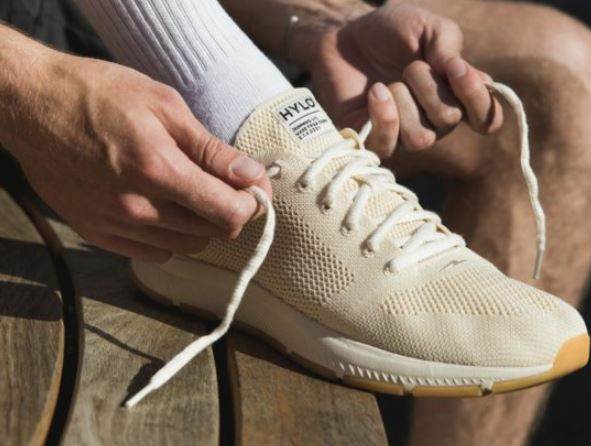Sports innovation among Future Fashion Factory beneficiaries

The projects aim to enable businesses to solve challenges through collaborative research with industry and academic partners.
Vorteq Sports specialises in aerodynamic skinsuits for athletes. Working with the University of Leeds, it will establish a specialist weaving facility so it can to reshore its materials and design new high-performance fabrics in the UK.
Hylo Athletics (pictured) will trial new end-of-life recycling processes for its running shoes. Michael Doughty, co-founder and managing director: “We are very grateful to have the support of the FFF in our pursuit to ensure that Hylo takes accountability for its products from beginning to end.”
RubyMoon Gym to Swim is investigating how to break down and reconstitute synthetic fibre activewear so it can be economically re-manufactured into new high-performance swimwear.
Optima 3D will develop a robotic prototype of a combined digital-design-engineering system for 3D weaving of textile products. It will enable fully integrated on-loom production of 3D-woven pieces, opening up creative and commercial possibilities outside the constraints of conventional weaving technologies.
Assyst Bullmer will explore how recent innovations in the automotive and aerospace sectors could accelerate the development of micro-factories for the UK fashion industry, incorporating small-scale tools, robotics and digital technologies. Designers, engineers and manufacturers will co-develop and test new machinery and processes.
SeFF Fibre will optimise hemp fibre processing within a Yorkshire supply chain, maximising the quantity of SeFF hemp in fine, high-quality yarns.
Other projects include:
• communicating accurate colour information digitally without sending physical yarn samples (Abraham Moon & Sons)
• testing the user journey for an AI-driven virtual bra fitting service (Brarista)
• developing AI and machine learning to automate factory planning (Pennine Weavers); and
• biodegradable sequins made from waste and industrial by-products (The Sustainable Sequin Company)
Professor Stephen Russell, director of Future Fashion Factory, said: “The fashion and textile industry has a huge role to play in achieving net zero and tackling other environmental challenges, as well as in creating economic opportunities by supporting the sustainable growth of design and manufacturing in the UK.
“These projects reflect the commitment of businesses to innovation that will help the industry meet these ambitions by reducing waste, using alternative materials, and enabling accurate digital communication about garments and fabrics so that only what is necessary, is made.”
Future Fashion Factory is part of the Creative Industries Clusters Programme, an £80 million initiative led by the Arts and Humanities Research Council (AHRC), part of UK Research and Innovation (UKRI). The Programme is led by the University of Leeds in partnership with the University of Huddersfield and Royal College of Art.










